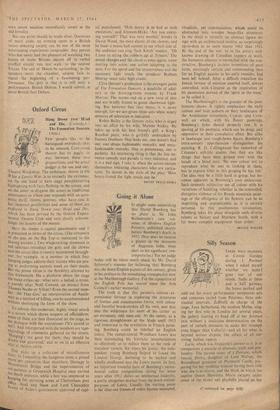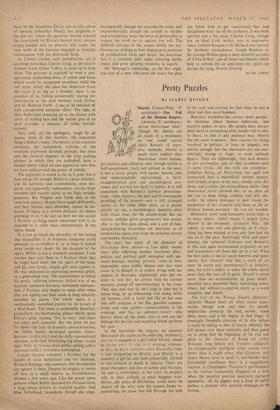Silly Season
THERE were moments at Covent Garden during 1 Puritani when I asked myself whether we hadn't gone out of our minds. Stalls at three and a half guineas, the house packed and sold out for every performance. sumptuous sets and costumes carted from Palermo, three sub- stantial intervals, Zeffirelli in- charge of the stage, Joan Sutherland, the modern Melba, sing- ing her first role in London for several years, the gallery roaring its head off at her fioriture (not without a malicious determination on the part of certain elements to make her triumph even bigger than Callas's)—and all for what is, beyond serious dispute, the silliest of all sur- viving Italian operas. Lucia, which was Donizetti's answer to it. is in comparison a miracle of dramatic truth and pro- fundity. The second scene of / Puritani, which reveals Elvira, daughter of Lord Walton, the Roundhead governor of Plymouth Castle, pre- paring for her wedding without having been told who she is to marry, and the third, in which the captive Queen Henrietta Maria escapes under cover of the bridal veil playfully placed on her
(Continued on page 418) /head by the incautious Elvira, are ne plus ultras of operatic imbecility. Hardly less laughable is tthe last act, where the garrison, having scoured the countryside for Elvira's Stewart lover, returns empty-handed only to discover hint under the 'very walls of the fortress, engaged in leisurely conversation with his distracted bride.
At Covent Garden such incredibilities are if anything intensified. Charles Craig, as the elusive Stewart, Lord Arthur Talbot, is made up to look blind. The prisoner is required to wear a con- spicuously resplendent dress of yellow and black which would be recognised anywhere, while the Neil under which she takes her departure from the castle is as big as a blanket; there is no question of its 'falling accidentally' during her intervention in the duel between Lord Arthur and Sir Richard Forth—it has to be hoicked off with considerable muscular effort. The sight of Miss Sutherland prancing up to the Queen with yards of trailing lace and the vacant grin of an idiot provides a moment of richly horrific comedy.
Very well, say . the apologists, laugh by all means; none of this matters: the important thing is Bellini's music. The beauty of his exquisite cantilena, the melancholy lyricism of the emotions expressed (limited, perhaps, but true) and the classical elegance of the long arching phrases in which they are embodied, have a unique charm which we can appreciate now that we have rediscovered the power of melody.
The argument is sound as far as it goes; but it does not go far enough. Bellini is a great melodist, and his harmony and orchestration, once des- pised, and apparently rudimentary, are far from unsubtle and exactly suited to his high melodic purposes. But Wagner and Verdi and, in the twentieth century, Mozart have taught differently, and their lessons, once absorbed, cannot be un- learnt. If opera as a serious dramatic art means anything to us, I do not see how we can accept I Puritani as being much concerned with it, or respond to it other than intermittently in the opera house.
It is not so much the absurdity of the-setting that disqualifies it. A dramatic composer could persuade us to swallow it, or to keep it tucked away inside our cheeks for the duration of the opera. Bellini is not a dramatic composer. Little touches here and there in I Paritani show that he might have been;• but the spirit of the times and his own lovely, elegiac gift were against it. He was interested in expressing personal griefs, in a generalised way. The environment in which his gentle, suffering creatures drifted was of no account, sustained dramatic movement unimpor- tant. 1 Puritani only begins to come alive when they are sighing out their souls in long carefully moulded set pieces. The whole opera is a mechanically assembled pretext for the luxury of a Mad Scene. This scene is undeniably beautiful, particUlarly the heart-easing phrase which opens Elvira's justly famous 'Qui la voce,' and there are other such moments. But the price we pay for them—the lack of dramatic characterisation, the feeble, barely developed gambits (tenor- baritone rivalry, etc.) and the dully conventional choruses, with their brutalising big drum—is too high. Only in Norma does public setting reflect personal conflict, to create a masterpiece.
Covent Garden exhumed 1 Puritan! for the benefit of Joan Sutherland and her husband, Richard Bonynge, who conducts. But the auguries are against it there. Despite its origins, it comes off best in a small theatre, as Glyndebourne showed a few years ago. Like the grand opera gestures which Bellini included for Parisian taste, a large house distorts its essential quality. And Miss Sutherland, beautifully though she sings, incomparably though she executes the notes, and unprecedentedly though she attends to rhythm and articulation, lacks the force of personality to impose the work on us against our will. The Zeffirelli settings of the scenes within the toy- fortress are striking in their elegant grey precision of architectural form and detail; the nocturnal Act 3, a romantic park under towering battle- ments and great glowing windows, is superb.
Mr. Bonynge's conducting, on the first night, was that of a man who loves the music but does
not know how to get consistently fine and disciplined work out of the orchestra. It was both spirited and a bit slack. Charles Craig, though not an ideal Lord Arthur, was in impressive voice. Gabriel Bacquier's Sir Richard was marred by rhythmic unsteadiness. Joseph Rouleau as Sir George Walton gave a most sensitive account of 'Cinta di fiori,' qne of those rare blooms which help to refresh the air and keep our spirits up during the long, bizarre evening.
DAVID CAIRNS



































 Previous page
Previous page